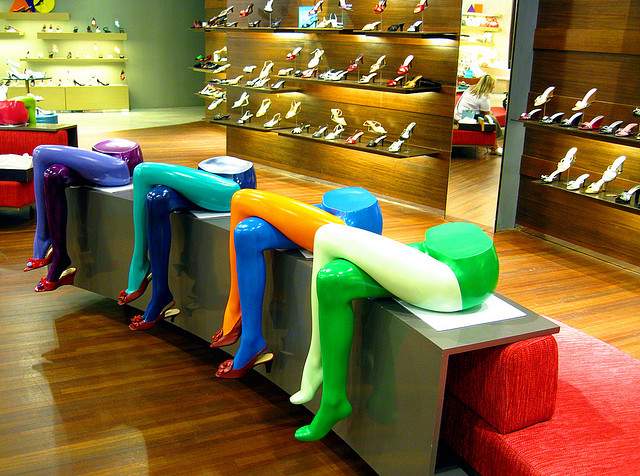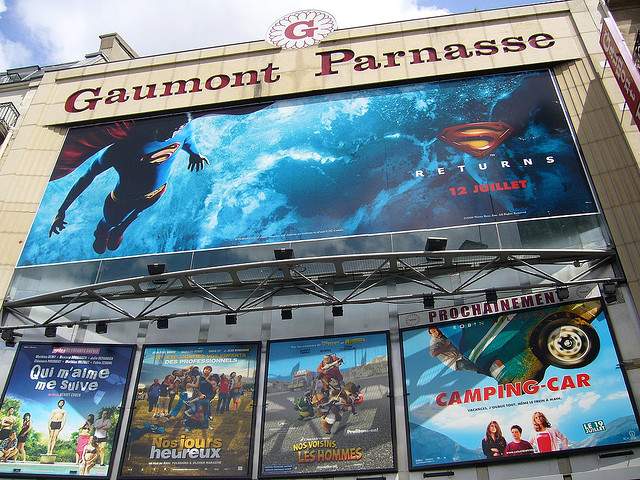First off, I’m sure there are plenty of people out there who genuinely love spending hours and hours in certain museums, so I don’t mean to imply that they are overrated for all of us. But I do contend that for another huge group of travelers, we often visit museums more out of obligation and their checklist appeal than out of pure enjoyment.
Even for those of us who aren’t especially fond of museums, it’s not easy to return from a city like, say, Madrid, and tell people we didn’t visit the Prado because we just weren’t too interested in what’s inside. One can sound like a philistine if they admit that they’d prefer to roam the aisles of a grocery store than roam the halls of a museum, but really there should be no shame in this.
I’ll also admit that I enjoy having visited many museums, particularly ones where the building and location are half the appeal. The Louvre in Paris, the Rijksmuseum in Amsterdam, and even the Getty in Los Angeles come to mind, where the setting itself can overshadow the art on the walls.
[social]
Why museums really are overrated, for many of us
If you think about it, with only a few exceptions, museums are all history museums one way or another. The most famous ones display stationary art that only the elite classes could ever hope to own or even see. Sure, some of them tell the stories of what life was really like at the time, but many of them are idealized versions or nothing like reality at all. What we are viewing is merely the most advanced visual entertainment of the day, often centuries ago.
It might be interesting to see how an artist interpreted a scene from the bible, but really is it more interesting than seeing how today’s citizens of that city are going about their real lives? History certainly has its place, but when you visit Madrid today might it not be more interesting to see some intricacies of modern big city Spanish life than what a lone artist a few hundred years ago was thinking?
I’ll also have to admit that most of the “art” in these museums leaves me completely cold, even if I can appreciate the limitless skill involved in creating much of it. I’m just not a visual person in that way. Movies, music, and books can make me laugh or cry or think introspectively, but paintings and sculptures do almost nothing for me.
>>read about the Top 5 living history museums
If you don’t love museums then be a modern-day anthropologist instead
Anthropologists typically examine how societies were, but you can also use a visit to another city to examine how a society lives today. I don’t mean “people-watching” in the town square or eating at the most famous restaurant in the city, but rather noticing details about how everyday citizens do what they do every day.
Personally, I’m far more fascinated when comparing the modern life of a citizen from another area with my own life, than seeing what 17th Century painters were doing compared to their contemporaries in another country.
Here are some of the things I enjoy instead of museums:
Check out a local supermarket
This is something some people do accidentally if they are looking to save money on a meal or two by assembling something themselves. But while you are in there you can also learn a lot about what makes this part of the world really tick. Do they eat a lot of fresh meat and fish, and how much does it cost compared to home? Is there a whole aisle filled with different pasta shapes or varieties of rice? Does the produce look familiar or exotic? What spices appear to be popular and what things from back home can’t you find at all?
In all of my travels I’ve been consistently amazed by how different one area is compared to another just based on what can and can’t be found in supermarkets. Even the style of packaging can be radically different. In some countries, even ones usually considered “green” almost everything comes wrapped individually or in tiny portions. And don’t forget the possibility of “supermarket souvenirs.” For a small price you can usually find something that people back home will find bizarre or amazing.
>>read about the 8 great shopping destinations around the world
Visit a music store
Yes, you’ll have to hurry in order to pull this one off, as these places are disappearing around the globe by the day, but right now it’s still possible. Take a look at which artists and styles of music are being promoted and are popular. You’ll usually find this information staring you in the face when you first enter the door.
Most music stores, even those small ones in airports, have current charts where they stock the Top 20 or whatever. Who’s number one right now? Do you recognize any of the artists, or all of them? How many of the chart-toppers are from the US or UK, and how many of them seem homegrown, or from elsewhere?
As a musician myself, I’ve always been fascinated by which artists are really international stars and which are unknown outside of their home countries. For example, “American Idol” winner Kelly Clarkson was a huge international star, even in countries that had never heard of the show, while Carrie Underwood – a ‘country’ artist – never really got traction outside of a few areas, even though she’s just as big in the US.
Walk through a mobile phone or electronics store
Especially lately, these small mobile phone and gadget stores are everywhere. These shops are a legitimate tourist attraction in Japan, as the Japanese always seem to be at least a few years ahead of the rest of the world when it comes to portable technology. But even in other cities, it can be interesting to see what the popular phones look like, and how much they cost, and what crazy features they have that are far better than what you have back home.
You can take a quick loop through one of these stores and instantly discover what the locals can afford and what they prefer. Chances are, it’s quite different from your stores back home, and you might have a few stories to tell either later in this country or once back in your own everyday life.
Check out the radio and TV
Particularly with television while traveling, I’ve heard countless travelers decry the very thought of ‘doing something on the road that you could do back home.’ And then they go back to reading their novel (which, ironically, actually is the exact same regardless of where you read it). The thing is, television is very different no matter where you are.
You can always catch local news and see what the top stories are, even if you can’t speak a word of the language. Do they have commercials? Are the commercials low budget and funny? Do they show foreign programs and do they dub them or subtitle them? What do working class people watch on TV in the evenings? Is it cheesy reality shows or solemn documentaries? You can really tell a lot about a culture by looking at their primetime TV offerings. Everyone denies watching much television, but the masses usually do watch anyway.
Radio is similar, if you have a way of tuning in. What sorts of music do they play on most stations? Do they really listen to a lot of local folk and traditional music, or are they really listening to the same pop hits that countries around the globe are listening to? It can also be fun to listen to a local not-in-English station for a while to hear how often they play English-language music, or include English-language phrases right in the middle of a dialogue you don’t otherwise understand.
Visit a department store
Sure, plenty of people will go out of their way to visit Harrod’s in London or the KaDeWe in Berlin, but this can be about more than actually shopping. The store doesn’t have to be enormous or famous either. How expensive are jeans in that city and do the current styles compare to the ones back home? Are there clothing items in an unusual style that might make good souvenirs and conversation starters back home? Are the clothes of higher quality than you are used to, or do they feel like they are made cheaply or even knock-offs?
And it’s not just clothes. Look at the furniture and housewares departments. If you look closely you’ll notice that something like a dishwasher looks one way back home, and is barely recognizable in another place, and they’ve never even heard of one in a third place. Do they have interesting gadgets or appliances that might be designed better or could be useful back home? As long as you stay out of Ikea, it can be amazing how different a simple shopping experience can be from one place to the next.
>>read about the original locations of 15 Mega-Chains
Go see a movie
As an American, I know what the movie experience is back home, and I’ve been shocked by how different it was in both London and in India, so there’s no telling what it might be like elsewhere. First, it could be interesting to see just which movies are playing at the moment and which are most popular. Some of us think it’s sad that American action films are popular in much of the world, but of course Bollywood movies actually dominate in some places outside of India.
Even in non-English-speaking countries, you might find that films have subtitles and English dialogue, and some countries actually make local films in English anyway, just because getting funding is easier and foreign markets are open that way. Are ticket prices higher or lower than back home? Do they sell beer and wine in the theater, and might that be a novelty in itself? Do they stand for the national anthem before the film begins and have an intermission (like they do in India)?
>>read about the 12 great foreign films to view before your trip
See a favorite band in concert
If you are much of a music fan, it’s probably easier than you realize to find out about which of your favorite bands are playing in cities when you’ll be there, and getting tickets online gets easier by the day. Even if you can’t get tickets in advance, the concept of scalpers or ticket touts is pretty much universal and sometimes you can get lucky.
You might discover that a favorite band from a different country is coming through when you are there, or even a favorite band from back home. It can be fascinating to hear the crowd reaction and what the performers say when they are somewhere where they assume they are only among the locals.
Go into a bar with no other tourists
This is common advice from hardcore travelers in general, but it also fits here with this theme. Going out drinking while traveling is one of the greatest sources of joy for many of us, but it can actually be challenging finding places that don’t have a majority of fellow tourists if you are going out near the city square or hotel area. But going out of your way to find these true locals-only places can be very much worthwhile, and you’ll usually save money on the booze as well.
Take a bus or metro out of the city center, or at least walk in the direction away from the lights, and you’ll eventually come across a watering hole that only sees a tourist once in a blue moon. Your guidebook says such and such is the “national drink,” but is that what the locals are really pouring down their throats? Or do they prefer cheap and watery beer like so many other places? What music is on the sound system or what is the TV showing in a place where tourists never go?
>>read about 10 unique drinks to sample on your next trip
You’ll learn far more about their real culture of today in a place like this than you would at the famous museum that we feel so obligated to visit anyway.
Do you have any recommendations that I’ve missed here?
Read more about:
- 15 of the Best Small, Quirky, and Unusual Museums in the US
- 11 Museums and Monuments that Take Us Back to the Future
- Seven Former Factories Turned Into Must-See Museums
Photo credits:
Louvre crowd by n0wakon Flickr, Paris supermarket by McPig on Flickr , Stockholm CD shop by Acesee on Flickr, Tokyo mobile phones by aldask on Flickr, Morocco TV by Manogamo on Flickr, Singapore department store by Sanctu on Flickr, Paris theater by Claytron on Flickr, MXPX in Santiago by Carlos Andrés Restrepo on Flickr, Jamaica bar by dubdem sound system on Flickr








